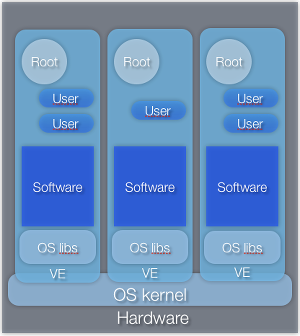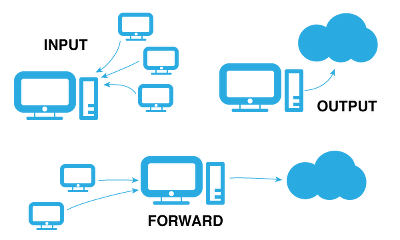- VOIP/PBX VPS
- Linux Server
- Reseller Hosting

- Details
Hosting
Services
Infrastructure
Company



Secure, isolated Linux Containers
OpenVZ is container-based virtualization for Linux. OpenVZ creates multiple secure, isolated Linux containers (otherwise known as VEs or VPSs) on a single physical server enabling better server utilization and ensuring that applications do not conflict. Each container performs and executes exactly like a stand-alone server; a container can be rebooted independently and have root access, users, IP addresses, memory, processes, files, applications, system libraries and configuration files.
Shared Kernel, Low Overhead, near bare-metal performance
Virtualization is accomplished through operating system-level virtualization technology where the host kernel is shared amongst guest VPSs. This is similar to the standard chroot or BSD Jail, but with security and resource sharing enhancements. Overall efficiency is nearly that of a dedicated machine, with negligible overhead introduced due to the lack of emulation or paravirtualization.


User defined Firewalling
Firewalling within each Virtual private Server (VPS) can be accomplished with IPtables. Customers have complete administrative control to configure their server's firewalling as needed. Most IPtables kernel modules are virtualized and available for use.


Filesystem in Userspace (FUSE) is an operating system mechanism for Unix-like computer operating systems that lets non-privileged users create their own file systems without editing kernel code. This is achieved by running file system code in user space while the FUSE module provides only a "bridge" to the actual kernel interfaces. Each LYLIX VPS has the FUSE device enabled.

SSHFS (SSH Filesystem) is a userland filesystem client that can be used to locally mount and interact with directories and files located on a remote server or workstation. It interacts with the remote file system via the SSH File Transfer Protocol (SFTP). This is a useful alternative to NFS, et.al., where users are confident that files and directories will not be targeted for writing by another user, at the same time

FuseISO is another userland fuse application that allows easy access to cd and dvd image files. fuseiso can also access a variety of other image files, not just .iso files.
Both TUN and PPP device access is enabled in every VPS. This is primarily to facilitate the setup of VPN networks inside the Virtual Private Server (VPS), both as VPN clients and servers. Popular software used for setting up VPNs includes OpenVPN.


Facilitates Software Licensing
Some commercial software applications require activation or licensing based on a MAC address. All LYLIX Virtual Private Servers (VPS) have a dummy eth0 network device activated. This device does not pass any network traffic, but just serves to provide the necessary MAC address.
Some examples of popular VOIP / PBX software that require licensing or activation based on an Ethernet device (eth0) and MAC address:





Asterisk Timing Support
Dahdi (Digium/Asterisk Hardware Device Interface) timing can optionally be enabled for any VPS. This facilitates supporting certain functionality within the Asterisk PBX software, including conferencing. Several FAQ articles are provided in our Knowledgebase outlining the compilation procedure if building Asterisk from source.
All VOIP VPS plans have Dahdi Timing already activated.


